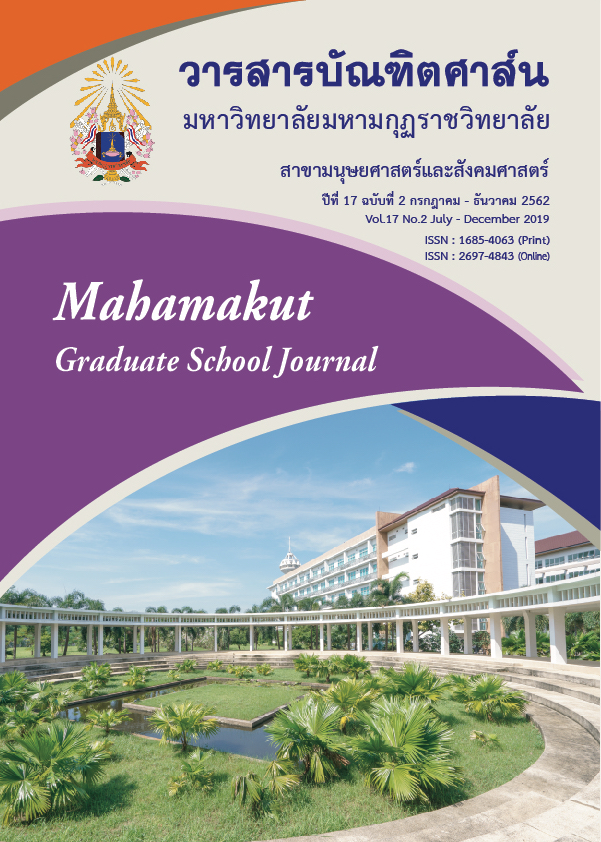โยนิโสมนสิการของผู้บริหารโรงเรียนพระปริยัติธรรมแผนกสามัญศึกษา
คำสำคัญ:
โยนิโสมนสิการ, ผู้บริหารโรงเรียนพระปริยัติธรรมแผนกสามัญศึกษาบทคัดย่อ
การวิจัยครั้งนี้มีวัตถุประสงค์เพื่อทราบ 1) โยนิโสมนสิการของผู้บริหารโรงเรียนพระปริยัติธรรมแผนกสามัญศึกษา 2) ผลการยืนยันโยนิโสมนสิการของผู้บริหารโรงเรียนพระปริยัติธรรมแผนกสามัญศึกษา วิธีการวิจัยประกอบด้วย 3 ขั้นตอน คือ ขั้นตอนที่ 1 ศึกษาค้นคว้าโยนิโสมนสิการของผู้บริหารโรงเรียนพระปริยัติธรรมแผนกสามัญศึกษา ขั้นตอนที่ 2 การวิเคราะห์โยนิโสมนสิการของผู้บริหารโรงเรียนพระปริยัติธรรมแผนกสามัญศึกษาขั้นตอนที่ 3 ผลการยืนยันการวิจัย กลุ่มตัวอย่างประกอบไปด้วยโรงเรียนพระปริยัติธรรมแผนกสามัญศึกษาจำนวน จำนวน 196 โรงเรียนผู้ให้ข้อมูลในแต่ละโรงเรียน คือ ผู้อำนวยการ และรองผู้อำนวยการ รวมทั้งสิ้น จำนวน 392 คน เครื่องมือที่ใช้ในการวิจัย คือ แบบสัมภาษณ์แบบไม่มีโครงสร้าง แบบสอบถามความคิดเห็น และแบบสอบถามผู้ทรงคุณวุฒิและผู้เชี่ยวชาญ สถิติที่ใช้ในการวิเคราะห์ข้อมูล ได้แก่ ความถี่ ร้อยละ มัชฌิมเลขคณิต ส่วนเบี่ยงเบนมาตรฐาน และการวิเคราะห์องค์ประกอบเชิงสำรวจ
ผลการวิจัยพบว่า
1. โยนิโสมนสิการของผู้บริหารโรงเรียนพระปริยัติธรรมแผนกสามัญศึกษาประกอบด้วย 8 องค์ประกอบ คือ 1) ผู้บริหารคิดแบบมีเหตุผล 2) ผู้บริหารคิดแบบมีกระบวนการ 3) ผู้บริหารคิดแบบรอบคอบ 4) ผู้บริหารคิดแบบมีส่วนร่วม 5) ผู้บริหารคิดแบบแก้ไขปัญหา 6) ผู้บริหารคิดแบบมีวิจารณญาณ 7) ผู้บริหารคิดแบบมีเป้าหมาย 8) ผู้บริหารคิดตามความเป็นจริง
2. ผลการยืนยันองค์ประกอบโยนิโสมนสิการของผู้บริหารโรงเรียนพระปริยัติธรรม แผนกสามัญศึกษา ทั้ง 8 องค์ประกอบ ได้รับการยืนยันจากผู้เชี่ยวชาญและผู้ทรงคุณวุฒิว่า ถูกต้อง เหมาะสม เป็นไปได้ และนำไปใช้ประโยชน์ได้
เอกสารอ้างอิง
ชาติ แจ่มนุช. สอนอย่างไรให้คิดเป็น. กรุงเทพฯ : โรงพิมพ์เลี่ยงเชียง, 2545.
ทิศนา แขมมณี. วิทยาการด้านการคิด กรุงเทพฯ : สำนักพิมพ์บริษัทเดอะมาสเตอร์กรุ๊ปแมนเนจเม้นจำกัด, 2544.
ดิลก บุญอิ่ม, “การใช้หลักโยนิโสมนสิการแนวอริยสัจเป็นฐานการเรียนรู้ด้วยตนเองในการ ดำรงชีวิต” มหาวิทยาลัยมหาจุฬาลงกรณ์ราชวิทยาลัย วิทยาลัยสงฆ์นครลำปาง, 2560.
ธัญวรัตน์ อุทโท, “รูปแบบการบริหารสถานศึกษาเพื่อส่งเสริมการคิดวิเคราะห์ของนักเรียนระดับ ประถมศึกษา” ดุษฎีบัณฑิต สาขาวิชาการบริหารการศึกษา มหาวิทยาลัยนอรท์ กรุงเทพ, 2559.
พระพรหมคุณาภรณ์ (ป.อ.ปยุตฺโต). ธรรมนูญชีวิต. พิมพ์ครั้งที่ 81. กรุงเทพฯ : พิมพ์สวย, 2550.
สุมน อมรวิวัฒน์. กัลยาณมิตรนิเทศ. กรุงเทพฯ : สำนักงานมาตรฐานการศึกษาและพัฒนาการเรียนรู้, 2546,
สุวิทย์ มูลคำ. ครบเครื่องเรื่องการคิด. พิมพ์ครั้งที่ 4. กรุงเทพฯ : ห้างหุ้นส่วนจำกัดภาพพิมพ์, 2548.
Ausubel,D.P. Education Psychology A Cognitive view. New York : Holt Rinehart and Winston, 1968.
Beyer, B.k. Practical strategies for the Teaching of Thinking. Boston : Allyn and Bacon, 1987.
Chien, J.C. Examining a successful urban elementary school : Putting the pieces for school improvement. New Jersey : Princeton University Press 2004.
for school improvement. New Jersey : Princeton University Press 2004.
Griffitts, D.C. “The effect of activity-oriented science instruction on the development.” Dissertation Abstracts International, 1987 ,
ดาวน์โหลด
เผยแพร่แล้ว
รูปแบบการอ้างอิง
ฉบับ
ประเภทบทความ
สัญญาอนุญาต
บทความวิชาการและบทความวิจัยในวารสารฉบับนี้ถือเป็นความรับผิดชอบของผู้เขียนเท่านั้น บทความที่ได้รับการตีพิมพ์ในวารสารบัณฑิตศาส์น ถือเป็นลิขสิทธิ์ของมหาวิทยาลัยมหามกุฏราชวิทยาลัย ตามพระราชบัญญัติลิขสิทธิ์



